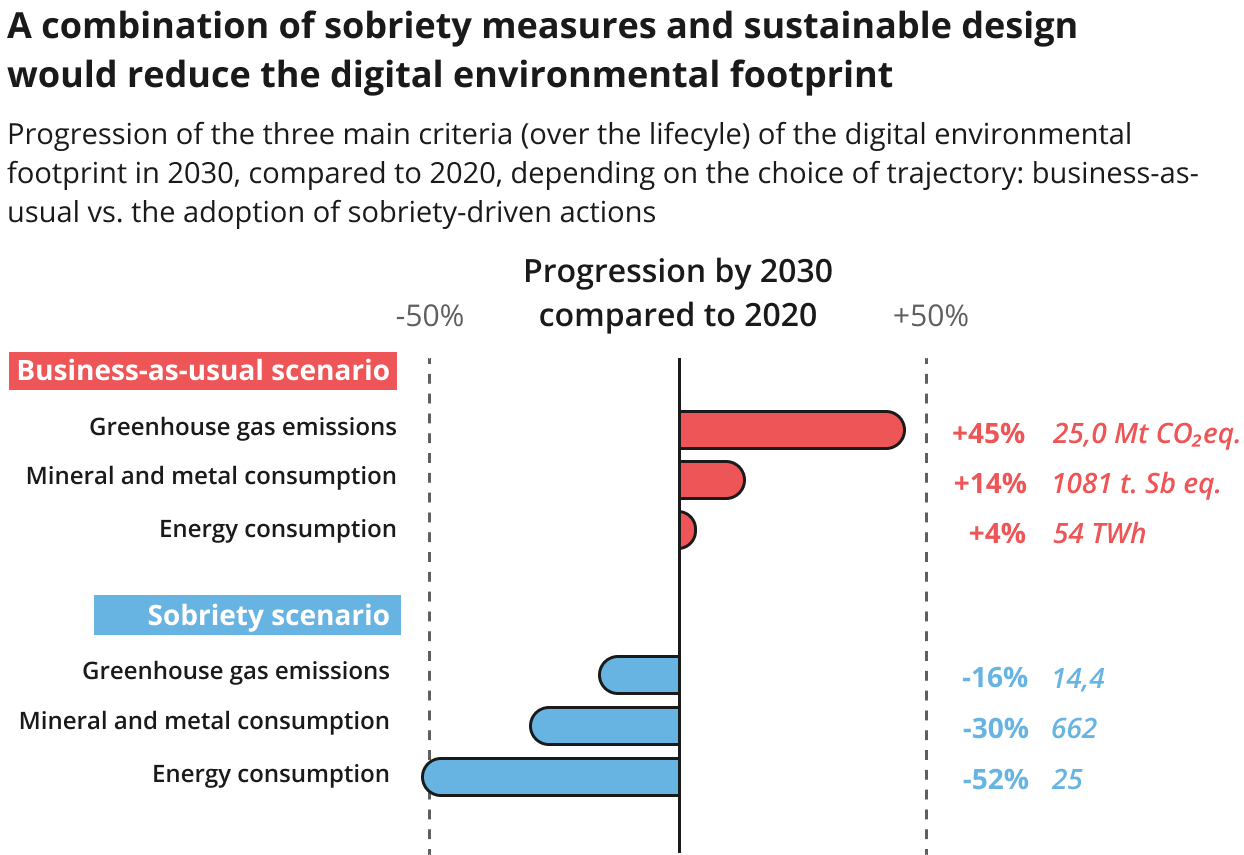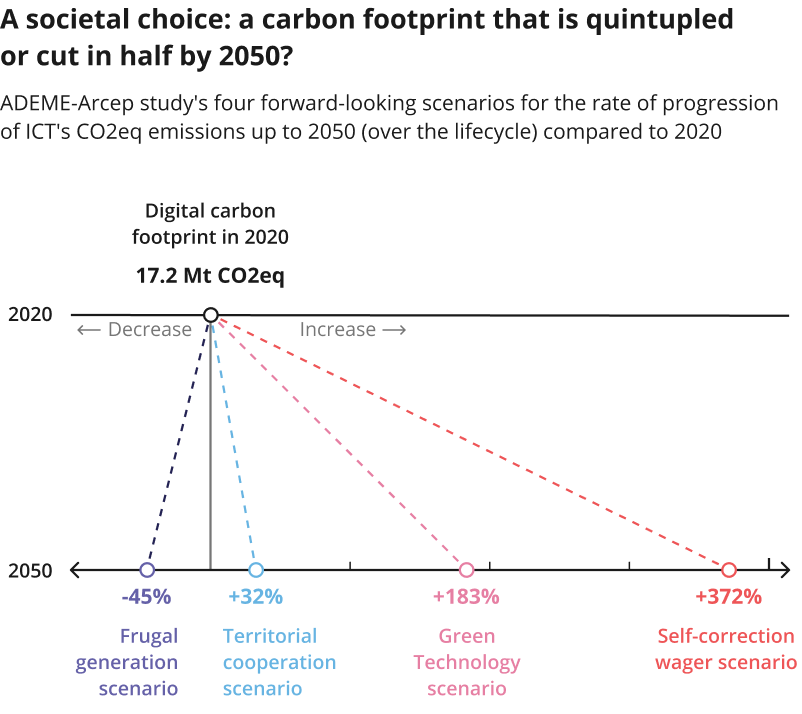Today, ADEME and ARCEP delivered the findings of their forward-looking study on the digital environmental footprint in France up to 2030 and 2050 to Christophe Béchu, Minister for the Ecological Transition and Territorial Cohesion, Agnès Pannier-Runacher, Minister for the Energy Transition, and Jean-Noël Barrot, Minister for the Digital Transition and Telecommunications.
Although ICT in many ways enable the ecological transition, their ongoing development also impact the environment in ways that must be more clearly understood.
The study reveals that, if no action is taken to contain ICT’s growing impact on the environment, their digital carbon footprint could triple between 2020 and 2050. It identifies levers for action to be taken and amplified immediately, to ensure that the ongoing development of our digital society is low carbon and resource-efficient.
In August 2020, the ministers assigned ADEME and ARCEP the task of measuring the digital environmental footprint in France, and of identifying levers for action and best practices for reducing it. After the publication in 2022 if the first two parts of the study, assessing the current impact of ICT as a whole[1], today the two organisations have delivered the third and final part, providing a forward-looking assessment of the digital environmental footprint in France, up to 2030 and 2050.
Between now and 2030, if no steps are taken to reduce the digital environmental impact, and consumption continues to grow at the current pace, by 2030 data traffic will increase sixfold and the number of devices by close to 65%, compared to 2020, particularly due to the rise of connected objects. The resulting increases between 2020 and 2030 would include:
- A roughly 45% increase in the digital carbon footprint in France (reaching 25 Mt CO2eq)
- A 14% increase in the consumption of abiotic resources (metals and minerals);
- A 5% increase in final energy consumption, during the device utilisation phase (to reach 54 TWh a year).
Between now and 2050, if no steps are taken, the digital carbon footprint could triple compared to 2020. If this development of digital technologies does, to a degree, help reduce other environmental impacts in other sectors (e.g. mobility), the energy and resource consumption it engenders nevertheless raises the question of feasibility (will it be possible to produce as much electricity and consume as many raw materials in a world of exacerbating pressures?) To achieve the goals of the Paris Agreement 2050, ICT must be accountable for their own impact – which is way a collective effort involving every stakeholder (users, device and equipment suppliers, content and application providers, network and data centre operators) is so crucial.
Levers for action identified to reduce the digital environmental footprint by 2030
The study highlights the fact that, in addition to the carbon footprint, one of the major environmental issues for digital technologies is the availability of strategic metals and the other resources used to manufacture devices (chiefly televisions, computers, ISP routers and smartphones, as well as connected objects whose impact is growing).
One lever for action is promoting “digital sobriety” which begins with an examination of the scale of development of new digital products and services, and a reduction or levelling off of the number of devices. Extending the life of digital devices, by further developing device refurbishment and repair is one key area of focus, as is raising consumer awareness of these issues.
By the same token, to improve energy efficiency in particular, sustainable design must become systematic: for devices, but also for all ICT equipment (network infrastructure and data centres), and in network and digital service deployment procedures.
Activating all of these levers would help reduce the digital environmental footprint between now and 2030: shrinking the carbon footprint by up to -16% compared to 2020.
Between now and 2050: very disparate impacts depending on the scenarios
ADEME devised four societal models for achieving carbon neutrality in France, as part of its “Transition(s) 2050“[2] exercise.
Applied to the ICT sector, the “Self-correction wager” scenario, which is the least restrictive on demand, would result in a digital carbon footprint that is five times larger compared to 2020.
“The ways of life of the early 21st century are maintained. But the proliferation of goods consumes a great deal of energy and materials, with potentially strong impacts on the environment. Society places its trust in the capacity to manage, if not correct social and ecological systems thanks to more material and financial resources to sustain a habitable world. This exclusive reliance on technologies is a wager as some of them are not yet mature.”
On the other end of the spectrum, the “Frugal generation” scenario would result in a digital carbon footprint that is cut in half compared to 2020.
“Major transformations in the way humans travel, heat their buildings, eat, shop and use devices, creating the ability to achieve carbon neutrality without involving carbon capture and storage technologies, which are unproven and uncertain on a large scale. New consumer expectations, but especially new behaviours are quickly translated into new consumption habits. Rising demand for energy that is draining resources and harming the environment is interrupted, thanks to behavioural, organisational and technological innovations. The transition is achieved primarily thanks to a frugality born of restrictions and sobriety.”
ADEME will soon be publishing a new issue of Transition(s) 2050 devoted to digital.
Christophe BECHU, Minister for the Ecological Transition and Territorial Cohesion: “Digital is our century’s technological revolution, and vital to helping accelerate the ecological transition while, at the same time, having a very large carbon footprint of its own. Knowing that the digital carbon footprint could double between now and 2030, and even triple by 2050, requires us to take collective action so that an accelerated ecological transition is synonymous with a low-carbon and sustainable digital transition. There are multiple avenues available: sustainable design, extending the life of digital products, sober consumption, the circular economy… Living in the 21st century means finding a way to reconcile our consumption habits and daily behaviours with the realities of a planet that we need to protect more fiercely. With the High Committee for Green ICT, this reconciliation is underway! I would like to salute the remarkable forward-looking work done by ARCEP and ADEME, which provides us with the keys for mapping this trajectory for a green digital revolution”.
Agnès PANNIER-RUNACHER, Minister for the Energy Transition: “Decarbonising the digital sector is a top priority. This report gives us a roadmap that can be used immediately. And which we will put into motion during Act 2 of the “Energy Sobriety” plan, within the working group that will be meeting once again in the coming weeks, along with Jean-Noël BARROT: the primary goal is to expose solutions, oversee their implementation and foster sobriety-driven behaviours, to work together on reducing our energy consumption.”
Jean-Noël BARROT, Minister for the Digital Transition and Telecommunications:
“This third section of the study carried out by ADEME and ARCEP, which is qualified and concrete, must serve as a wake-up call. If we don’t change anything, if we let current trends continue, the impact on the environment could skyrocket: +45% by 2030. Public action, both European and national, is creating pressure to demand radical change in sustainable design, warranties and repairability guarantees from manufacturers and vendors. The Government is fully committed to ensuring that our children and grandchildren inherit a viable planet. Inertia and inaction are not an option; we have no right to sit still, be it in the digital or other sectors. Our society must successfully undertake two major transitions: the ecological transition and the digital transition. And it is imperative that the two be tackled together.”
[1] ADEME and Arcep joint press release “The digital environmental footprint in France: ADEME and Arcep submit their first report to the Government” (19 January 2022)
Associated documents:
- Press kit and infographics: “The digital environmental footprint: 2020, 2030 and 2050 –ADEME-ARCEP study” (English version available)
- Synopsis provided to the Government on the outlook for 2030 – 2050
- “The digital environmental footprint: 2020, 2030 and 2050 – ADEME-ARCEP study” – Synopsis posted online by ADEME
- Forward-looking study 2030 – 2050
- Slide presentation
- ADEME and Arcep joint press release: “The digital environmental footprint in France: ADEME and Arcep submit their first report to the Government” (19 January 2022)”
Read also
Téléchargez le dossier de presse
(pdf - 2.45 MB)
(PDF • 2 MB)


